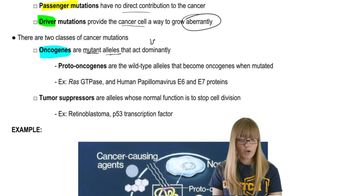Here are the essential concepts you must grasp in order to answer the question correctly.
Phenotype
Phenotype refers to the observable physical and physiological traits of an organism, which result from the interaction of its genotype with the environment. It includes characteristics such as morphology, development, biochemical properties, and behavior. Understanding phenotype is crucial for studying how genetic mutations manifest in an organism.
Recommended video:
Zygotic Gene Mutations
Zygotic gene mutations occur in the zygote, the fertilized egg formed by the union of sperm and egg. These mutations can affect the development of the organism from the earliest stages, potentially leading to various phenotypic outcomes. The timing and nature of these mutations can significantly influence the resulting phenotype.
Recommended video:
Genotype-Phenotype Relationship
The genotype-phenotype relationship describes how the genetic makeup (genotype) of an organism influences its observable traits (phenotype). This relationship is complex, as multiple genes can interact to produce a single trait, and environmental factors can also play a significant role. Understanding this relationship is essential for predicting the effects of zygotic gene mutations on phenotype.
Recommended video:
 Verified step by step guidance
Verified step by step guidance


